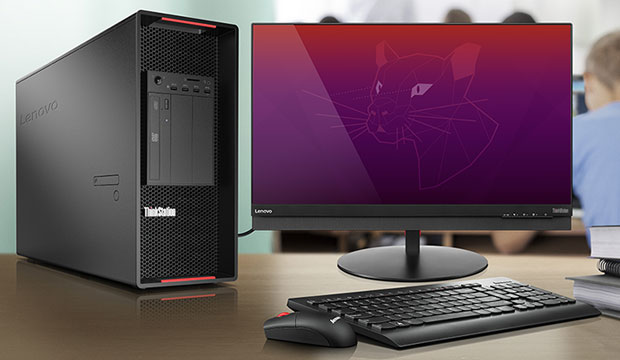As the next step in its Linux expansion program, Lenovo on Wednesday announced the launch of Linux-ready ThinkPad and ThinkStation PCs pre-installed with Canonical’s popular Ubuntu technology.
The company also now brings Linux certification to its ThinkPad and ThinkStation Workstation portfolio, along with easing deployment for developers and data scientists. Lenovo is moving to certify the full workstation portfolio for top Linux distributions from both Ubuntu and Red Hat. This includes every model and configuration.
Previously only accessible to enterprises via a customized bid, Lenovo now offers a comprehensive range of nearly 30 Ubuntu-loaded devices available for purchase via Lenovo.com. These include 13 ThinkStation and ThinkPad P Series Workstations and an additional 14 ThinkPad T, X, X1, and L series laptops. All come with the 20.04 LTS version of Ubuntu, with the exception of the L series which will have version 18.04.
A More Streamlined Linux Experience
“Lenovo’s vision of enabling smarter technology for all really does mean ‘for all.’ Our announcement of device certification in June was a step in the right direction to enable customers to more easily install Linux on their own. Our goal is to remove the complexity and provide the Linux community with the premium experience that our customers know us for,” according to Igor Bergman, vice president of PCSD Software and Cloud at Lenovo.
This is the next step to offer Linux-ready devices right out of the box, he said.
This expansion brings increased accessibility to open source apps, libraries, and tools to enhance developers’ productivity. This offers a seamless out-of-box experience for those who previously braved the often-time-consuming process of loading Linux onto their Lenovo devices themselves. It also provides this community of programmers, software developers, AI professionals, and other Linux users an increased range of devices from which to choose, he added.
“Lenovo’s expansion of Ubuntu certified devices shows great commitment to open source and the Linux community. With data scientists and developers increasingly needing Linux for emerging workloads, this collaboration enables enterprises to equip their employees with the assurance of long-term stability, added security, and simplified IT management,” said Dean Henrichsmeyer, vice president of engineering at Canonical.
By providing these devices preloaded with the OEM version of Ubuntu, Lenovo is removing complexity for Linux users and introducing end-to-end web and phone support for platform-related Linux issues.
Taking the Next Step
The announcement comes on the heels of Lenovo’s release of computers running Fedora Linux desktop, the community version sponsored by RedHat Linux. That was a big deal, noted Red Hat’s senior software engineering manager, Christian Schaller, at the announcement earlier this month.
The events marked a double milestone for Lenovo. This was the first time Fedora shipped pre-installed on a laptop from a major vendor. It also was the first time one of the largest laptop makers sold directly to consumers premium laptops with the Linux desktop OS pre-installed.
Both September announcements by Lenovo were bittersweet. Years ago, first IBM sold ThinkPad laptops with Linux pre-installed and then Lenovo continued that product line. Then, in 2008 Lenovo dropped that Linux product line. In July of last year, IBM closed a landmark acquisition of Red Hat for US$34 Billion.
“Lenovo has been taking steps toward this expansion for many years, offering pre-loaded Linux PCs for companies that submitted customized bids and certifying a range of our PCs to Linux specifications that would allow users to more easily install the OS on a Lenovo device themselves,” Bergman told LinuxInsider.
In June, the Lenovo Workstation team published a blog article announcing the expansion of the Linux program. That included the impending availability of a wide range of preinstalled Linux PCs, he added.
“This announcement is the manifestation of that promise, specifying the PCs available, both within the workstation portfolio and beyond,” Bergman noted.
Lenovo embarked on this expansion in response to increasing commercial customer demand, particularly IT professionals and developers that are part of the global open-source community. Lenovo seeks to offer these users more choices in their smart technology, he explained.
A Start, But Limited
It is worth noting that the new Linux configurations are all Thinkpad laptops or ThinkSystem desktops aimed primarily at businesses and IT professionals, particularly developers. They should also be attractive to folks working in areas where Linux predominates, like AI/machine learning and HPC/supercomputing, both areas where Lenovo is active, according to Charles King, principal analyst at Pund-IT.
“The company is astute in assessing commercial opportunities in global markets so I expect these new offerings should do very well,” he told LinuxInsider.
Lenovo has been actively building out its Linux portfolio this year via strategic partnerships announced with Fedora and Red Hat. But the company’s focus on Linux lags some competitors, King remarked.
Dell, in particular, has sold Linux-loaded laptops for the better part of a decade via a program called Project Satellite aimed primarily at developers. The company offers both slimline XPS13 and muscular Precision workstations and tower systems certified by both Red Hat and Canonical.
“In this context, Lenovo’s decision to jump into the deep end with Fedora and Canonical could signal that adoption of Linux-based PCs and laptops is accelerating,” King said.
Why Ubuntu?
“Ubuntu is a popular, well-respected and modern, open-source operating system on Linux for the enterprise server, desktop, cloud, and IoT. Lenovo has worked closely with Canonical, the publishers of Ubuntu, for several years, so expanding our collaboration with them was a natural choice,” Bergman observed.
Lenovo is actively involved with several other open source communities, as well. One of the main Linux communities is Fedora, which Lenovo announced earlier this year.
“Ultimately, we want to support open source in a way that fits its expectations and ethos,” Bergman said.
All of the Linux Ubuntu configurations come with GNOME as default desktop. For the other desktops you do not have to reinstall the OS. While you cannot select it in the Lenovo purchase, you can install/select the other desktops the same way Ubuntu has always supported it. It is all standard Ubuntu with no Lenovo restrictions, according to Lenovo.
Availability
Included in this global expansion are the following Lenovo ThinkPad and ThinkStation devices. They will be available globally starting September 2020 and will roll out in phases through 2021:
- ThinkPad T14 (Intel and AMD)
- ThinkPad T14s (Intel and AMD)
- ThinkPad T15p
- ThinkPad T15
- ThinkPad X13 (Intel and AMD)
- ThinkPad X13 Yoga
- ThinkPad X1 Extreme Gen 3
- ThinkPad X1 Carbon Gen 8
- ThinkPad X1 Yoga Gen 5
- ThinkPad L14
- ThinkPad L15
- ThinkPad P15s
- ThinkPad P15v
- ThinkPad P15
- ThinkPad P17
- ThinkPad P14s
- ThinkPad P1 Gen 3
- ThinkStation P340
- ThinkStation P340 Tiny
- ThinkStation P520c
- ThinkStation P520
- ThinkStation P720
- ThinkStation P920 (Pictured Above)
- ThinkStation P620
All of the PCs included in this announcement, with the exception of the ThinkPad L series laptops, will be available with the 20.04 LTS version of Ubuntu that was released in April 2020. The ThinkPad L14 and L15 will be available with version 18.04 LTS.
The announcement focuses on Lenovo’s commercial range of PCs. The company continues to explore expansion and will share more later, said Bergman.
















































